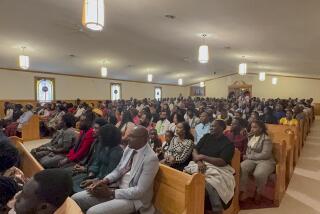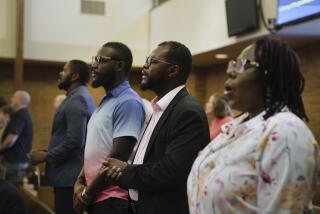In Haiti, some see the spirit world behind the quake
Reporting from Port-Au-Prince, Haiti â The night was filled with voices, murmuring then gathering together then rising into hymns and chants that carried far in the balmy air.
This was the time for God and for spirits.
On a road next to the central cemetery, residents of a small slum were lying on mattresses and pieces of cardboard set out on the broken pavement. A woman started to hum a Christian song, and soon rallied a chorus, singing and dancing and clapping for rhythm.
âKem kontan Jesus renmem, aleluya,â they sang -- joyously, not mournfully. âIâm so happy Jesus loves me. Hallelujah.â
Farther down the road, two voodoo priestesses sat down on buckets with another group. They made the sign of the cross and started a Catholic hymn, before splashing some rum on the ground to reach out to the gede, the spirits of the dead.
âWe are thanking you that we are here,â said Marie Michele Louis, a priestess, called a manbo here. âWe are thanking all the spirits of Africa. We are not afraid to serve the spirits of Guinea.â
In Haiti, the spiritual world is omnipresent, a raucous realm where voodoo, folklore, superstition, Protestant and Catholic faiths compete, clash and sometimes converge.
When the earth shakes no one talks about fault lines and tectonic plates. Instead, there are many otherworldly explanations of why the earthquake hit and the aftershocks go on here, from the biblical to the superstitious to the conspiratorial.
The devastation Jan. 12 has also widened a rift that has been growing since U.S. missionaries began coming to Haiti in the 1800s: Evangelical Christians blame voodoo for bringing on this ruin, claiming it is satanic. Voodoo priests counter that the Christians are exploiting the catastrophe to convert people and raise money.
âThe Protestants tell people that voodoo is evil,â said Louis, 52, who lives next to the cemetery. âThey say that voodoo is responsible for this. They are taking advantage of the situation to get people into churches.â
Louis was teaching her children about the spirits in her temple, which stands behind an iron door on an alley off the Grand Rue downtown, when the earthquake hit.
The walls fractured, but the two-story building didnât fall.
âItâs thanks to the spirits that we are alive today,â Louis said.
Voodoo has a pantheon of these spirits, the lwa, which evolved from the beliefs slaves brought from Africa in the 17th and 18th centuries. When they were taught by priests in the French colony, they saw the lwa as similar to the Catholic saints, if not actually the saints themselves, and appropriated certain Catholic rituals and liturgy.
Followers believe in God as the almighty power, but find his underlings to be more accessible.
âWe are like good neighbors with Catholics,â Louis said. âThey just tell us to pray, they donât tell us weâre evil.â
The Roman Catholic Church does not endorse voodoo, and many Catholics avoid it, but it has not combated it as the Protestant faiths have.
Even under constant assault from Christians, voodoo and traditional folklore have retained deep roots, particularly in the slums and countryside. A man might casually mention that another man carrying a heavy load on a cart is a zombie, or that vampires are killing children in the night.
The spirits of the dead that Louis invokes are a mischievous bunch. They wear black top hats and glasses, live in cemeteries and have funny names like Gede Ti Pete -- Little Fart.
The spirit Louis knows best is Stupide Lacroix. When he appears, he adjusts his belt and top hat and saunters around with a cane. Believers splash high-quality Barbancourt rum on the ground for him.
Louis says she calls on him to heal and protect living people and their ancestors. That is the true root of the practice, she says, not sorcery.
But sorcery, including endless rumors of human sacrifice, is what has given voodoo a sinister reputation around the world, which practitioners, intellectuals and foreign anthropologists have been trying to change for decades. And itâs why the daily American Airlines flights between Miami and Port-au-Prince are filled with Christian missionaries.
When televangelist Pat Robertson last week said that in the late 18th century Haiti made a âpact with the devilâ for its freedom from the French, he was echoing a message that proselytizing U.S. and European missionaries have long drummed in here.
Protestant faiths, particularly Pentecostal ones, have been gaining a stronger foothold in the country since the dictatorship of Francois âPapa Docâ Duvalier, who invited in U.S. missionaries and once held a reception for Oral Roberts at the National Palace.
The missionaries didnât threaten him politically, brought money into the country and eroded the dominance of the Catholic Church he loathed.
Still, the relationship with the Christians was strange for a man who wanted Haiti to remove European cultural influences and used voodoo himself to inspire fear. His owlish glasses and black attire, in fact, gave him the look of a gede.
His brutal reign -- employing death squads called the Tonton Macoutes, named after a folkloric figure who took children away in a knapsack as they slept -- reinforced voodooâs dark reputation in and out of Haiti.
âThe earthquake is a warning from God to all those witch doctors, letting them know what he can, what he will do,â said Michele Nandy Henry, 26, an evangelical Christian.
âAll the spirits have a leader. Thatâs Lucifer.â
Henry hinted at the nebulous, whispered-about relationship most Haitians have with voodoo, even those who consider themselves Christian. Voodoo is a very private if not secretive practice for many Haitians.
âA lot of the pastors even go to the voodoo doctors to get a lot of parishioners and white people to donate to their church,â she said. âWhen a real Christian comes up to them, they feel the power of God and cannot look them in the eye.â
Henry was attending a lively church service in front of the gray cinder-block Eglise de Dieu in the hilly Place Cazeau area on the east side of the capital. The pastor had dragged the pews into the dirt road, and a band played evangelical songs.
At least 200 people gather there every night, praying, dancing, drumming, singing.
âJesus is coming soon!â they screamed.
Pastor Thimote Elise, 52, has been telling his parishioners that the earthquake is a sign of the second coming of Christ.
He cited Matthew 24: 7-8, which says: âNation will rise against nation, and kingdom against kingdom. There will be famines and earthquakes in various places. All these are the beginning of birth pains.â
âThis is the beginning of the signs that God is going to come,â Elise insists.
He didnât think the earthquake was a mystical thing, as voodoo is often described.
âEven if it was mistik, if God didnât give you a way, it couldnât be done,â he said.
In the rubble of the city of Leogane west of the capital, Francoise Rosmine voiced the same belief, as she scrubbed her childrenâs clothes in a bucket.
âMistik donât have more power than God,â she said. âThis is a powerful thing.â
A block away, Marie Elmera Surme, 56, sat in front of a pale-green hut with a peaked tin roof that she planned never to step foot inside again for fear it would collapse on her.
âGod wouldnât do this treacherous thing,â she said. âIf it was God, he would just do it for a day. Itâs got to be the mistik.â
Tison Jean Baptiste, 46, standing nearby, said he thought the earthquake was caused by the United States conducting some type of nuclear test in the ocean, a rumor running through the country.
âI donât think God would do that,â he said.
âIt has to do with humans.â
Back at the slum next to the central cemetery in Port-au-Prince, the manbo Louis and her followers sing to the spirits each night, as evangelical Christians sing their own songs nearby.
At 8:30 p.m., the road was blocked by bricks so that passing cars wouldnât hit people sleeping in the streets. A woman tucked her little boy in. Men down the road crouched in the blue light to watch a television hooked up to car batteries. A trash fire lighted up a soccer field filled with sleeping people. A little bar blasted music with a stereo speaker, as a man on a stool sipped a beer outside.
The songs rose up, and then fell away -- mostly evangelical Christian.
A large woman in a lime green dress, Louis did not want to sing next to them and cause a stir. Many people have been angry at manbos since the quake. So she set up at an empty spot down the road. Crosses loomed above the cemetery, silhouetted against pale, scudding clouds and a starry night.
Louis started singing, and four women followed, a call-and-response with distinctly African cadences.
âPlease donât let our house fall,â they sang in Creole. âPlease donât let our house fall.â
The Christians sang down the block.
A crescent moon was gliding toward the bay below, and the lilting voices were a bit of beauty in a ruined city.
More to Read
Sign up for Essential California
The most important California stories and recommendations in your inbox every morning.
You may occasionally receive promotional content from the Los Angeles Times.











